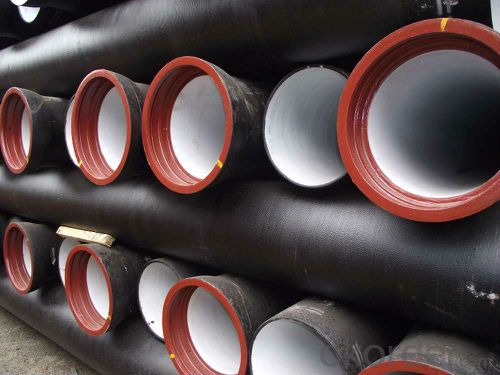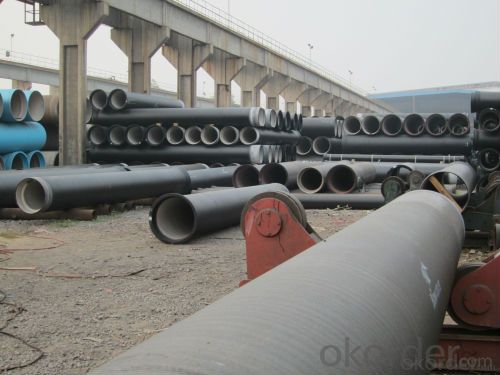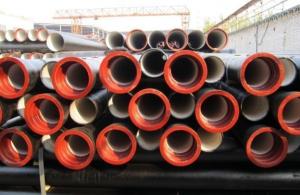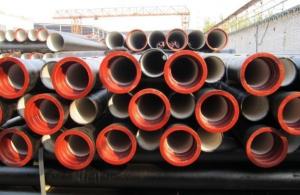Ductile Iron Pipe DN300 EN545 / EN598 / ISO2531
- Loading Port:
- China main port
- Payment Terms:
- TT or LC
- Min Order Qty:
- 20 m.t.
- Supply Capability:
- 200000 m.t./month
OKorder Service Pledge
OKorder Financial Service
You Might Also Like
1.Ductile Iron Pipe Description :
DI pipe fittings are manufactured according to ISO 2531 or BS EN545 or BS4772 FOR POTABLE WATER ,internal is cement lining or wet epoxy coating;External is zinc plus bitumen or wet epoxy coating. We also manufacture ductile iron fittings with fusion bonded epoxy both inside and outside. All the producets are sutible to water pipes fields.
We have passed ISO9001,ISO14001,OHSMS18001 certificate.
2.Main Features of the Ductile Iron Pipe:
•High yield strength
•High tensile Strength
•High corrosion resistance
•Pressure Resistence
•Anti-corrosion
•Installation is convenient
•Satisfy the highest hygienic standards
3.Ductile Iron Pipe Images:


4.Ductile Iron Pipe Specification:
Standard: API SPEC 5L 44th eidtion,ASTM A252-98(2007)
Grade: A53 Grades A/B, ASTM A106 Grades B/C,ASTM A179
AWWA, C200, ASTM A139, ASTM A120, API 5L Grade B
X42, X52, X56, X60, X65, X70, X80, X100
Weld Alternatives: LSAW
OD size range: 6.4~44.5mm
Wall thickness: 406.4~1422mm
Length: 3 - 12 m according to requirment
Note: Other grade can also be provided after consulting. Special design are available for coal slurry conveyance LSAW line tube -- Service
5.FAQ:
We have organized several common questions for our clients,may help you sincerely:
1.Q: Why would you choose ductile iron pipe rather than other pipe materials?
A:The reasons are obvious for that not only ductile iron pipe possesses the inherent strength and flexibility of ductile
iron, combined with proven corrosion protection systems, but also the cost savings can be achieved from design to
installation and commissioning.
2.Q:Why can you guarantee the inner of pipes can’t be corroded?
A: High alumina cement mortar lining and sulphate-resistant cement mortar lining. These two special linings are applicable
to inner anti-corrosion for sewage pipes, improving resistance to erosion of the sewage components.
- Q:How are ductile iron pipes protected from external damage?
- Ductile iron pipes are protected from external damage through the application of protective coatings. These coatings act as a barrier, shielding the pipes from corrosion and other forms of external damage. Additionally, the pipes may be encased in concrete or installed in a casing pipe to provide further protection against external forces and impacts.
- Q:Can ductile iron pipes be used for underground cable conduits?
- Yes, ductile iron pipes can be used for underground cable conduits. Ductile iron pipes are known for their strength, durability, and corrosion resistance, making them suitable for various applications, including underground cable conduits. Their ability to withstand heavy loads and external pressures makes them a reliable choice for protecting and housing underground cables.
- Q:What are the different sizes of ductile iron pipes available?
- Ductile iron pipes come in a range of sizes to meet different needs and purposes. Typically, the diameter of these pipes varies from 3 inches to 64 inches. This variety in sizes offers versatility and adaptability in various sectors such as water supply, sewage systems, irrigation, and industrial piping. Smaller ductile iron pipes, with diameters ranging from 3 to 12 inches, are commonly used for residential and small-scale purposes like household plumbing, fire hydrant systems, and small irrigation projects. These sizes are commonly found in urban areas and residential neighborhoods. For larger-scale applications, larger ductile iron pipes are employed. These pipes can have diameters ranging from 14 to 64 inches. They are primarily used in municipal water supply systems, wastewater treatment plants, and industrial facilities where there is a need for high-volume water flow. The wide array of sizes available in ductile iron pipes ensures that they can accommodate different flow rates and pressure requirements. This allows engineers, contractors, and designers to choose the appropriate size based on the specific demands of a particular project or application. To ensure the proper selection of ductile iron pipe size for a specific project, it is essential to consult industry standards, local regulations, and engineering guidelines. This ensures that the pipes meet the required performance standards and are suitable for the intended use.
- Q:What are the different methods for restraining ductile iron pipe?
- Some different methods for restraining ductile iron pipe include using thrust blocks, tie rods, and flexible couplings. Thrust blocks are concrete structures that are placed at bends or fittings in the pipeline to resist the axial thrust forces. Tie rods are used to connect the pipe to fixed points, providing additional support and preventing movement. Flexible couplings can also be used to restrain pipe by connecting sections together, allowing for some movement while still maintaining stability.
- Q:How is ductile iron different from cast iron?
- Ductile iron and cast iron are two types of iron alloys that differ in terms of their composition, properties, and applications. The main difference between ductile iron and cast iron lies in their microstructure and mechanical properties. Ductile iron, also known as nodular cast iron or spheroidal graphite iron, is a type of cast iron that undergoes an additional treatment process to enhance its strength and ductility. This is achieved by adding small amounts of magnesium to the molten iron during the casting process, which results in the formation of graphite nodules throughout the material. These graphite nodules act as stress raisers and prevent the propagation of cracks, making ductile iron more resistant to fractures and providing it with improved ductility compared to cast iron. In contrast, cast iron is a type of iron alloy that contains a higher carbon content than ductile iron. This higher carbon content leads to the formation of graphite flakes within the material, giving cast iron its characteristic brittle nature. Due to its brittleness, cast iron is more prone to cracking and less flexible than ductile iron. However, cast iron has excellent compressive strength and is highly resistant to wear and abrasion, making it suitable for applications where strength and durability are important, such as in engine blocks, pipes, and manhole covers. Another difference between ductile iron and cast iron is their machinability. Ductile iron is generally easier to machine due to its lower carbon content and the presence of graphite nodules, which act as lubricants during the cutting process. On the other hand, the presence of graphite flakes in cast iron can cause tool wear and result in poor surface finish during machining. In summary, ductile iron and cast iron differ in their microstructure, mechanical properties, and applications. Ductile iron offers improved ductility and resistance to fractures, making it suitable for applications requiring flexibility and impact resistance. Cast iron, with its higher carbon content and graphite flakes, provides excellent compressive strength and wear resistance, making it ideal for applications requiring strength and durability.
- Q:How are ductile iron pipes different from cast iron pipes?
- Ductile iron pipes are different from cast iron pipes in terms of their composition and properties. Ductile iron pipes are made from a type of cast iron that has been treated with magnesium to improve its strength and flexibility. This makes ductile iron pipes more durable, impact-resistant, and less prone to cracking or breaking compared to traditional cast iron pipes. Additionally, ductile iron pipes have a higher tensile strength, allowing them to withstand higher internal and external pressures. In summary, ductile iron pipes are a more modern and advanced version of cast iron pipes, offering improved performance and longevity.
- Q:What is the expected burst pressure of ductile iron pipes?
- Several factors, including the diameter, wall thickness, and grade of ductile iron, can influence the expected burst pressure of ductile iron pipes. However, ductile iron pipes are typically designed and manufactured to withstand high-pressure loads. Typically, the expected burst pressure of ductile iron pipes ranges from 350 psi to 700 psi. It is important to note that this is a general range, and the actual burst pressure can vary depending on the specific design and manufacturing standards followed. To determine the exact expected burst pressure for a specific ductile iron pipe, it is advisable to refer to the manufacturer's specifications or relevant industry standards such as the American Water Works Association (AWWA) C150 or ISO 2531. These guidelines provide recommendations for ductile iron pipes and their performance under different conditions. Additionally, local building codes and regulations may also include specific requirements for the installation of ductile iron pipes.
- Q:What is the relationship between the mechanical properties of spheroidal graphite cast iron and its spheroidization rate?
- The spheroidization level reflects only the final shape of graphite. The higher the spheroidization level of ductile iron is, the better its performance is, but this is not entirely the level of spheroidization to determine.The mechanical properties of nodular cast iron are closely related to its microstructure. Different grades of ductile iron require different mechanical properties such as tensile, yield, elongation, impact and hardness.
- Q:How does ductile iron pipe perform in extreme temperatures?
- Ductile iron pipe performs well in extreme temperatures due to its ability to expand and contract without cracking or breaking. It has a high thermal conductivity, allowing it to efficiently transfer heat without compromising its structural integrity. Additionally, its corrosion resistance properties make it suitable for both hot and cold environments, ensuring long-term performance even in extreme temperature conditions.
- Q:Are ductile iron pipes resistant to frost heave?
- Ductile iron pipes are generally considered to be resistant to frost heave. Frost heave occurs when water in the ground freezes and causes the surrounding soil to expand and lift. Ductile iron pipes have high tensile strength and flexibility, which allows them to withstand the forces exerted by frost heave without cracking or breaking. Moreover, ductile iron pipes have a high resistance to impact and can handle significant external loads. This makes them particularly suitable for areas that experience freezing temperatures and potential frost heave. Additionally, the joints in ductile iron pipes are designed to provide a tight seal and prevent water infiltration, reducing the risk of freezing and subsequent frost heave. However, it is important to note that while ductile iron pipes are resistant to frost heave, they are not completely immune to it. Extreme temperature fluctuations, prolonged freezing conditions, or inadequate insulation can still pose a risk to the integrity of the pipes. Therefore, proper installation techniques, including appropriate bedding and backfilling materials, thermal insulation, and proper maintenance, are crucial to ensure the long-term performance and resistance of ductile iron pipes to frost heave.
1. Manufacturer Overview |
|
|---|---|
| Location | |
| Year Established | |
| Annual Output Value | |
| Main Markets | |
| Company Certifications | |
2. Manufacturer Certificates |
|
|---|---|
| a) Certification Name | |
| Range | |
| Reference | |
| Validity Period | |
3. Manufacturer Capability |
|
|---|---|
| a)Trade Capacity | |
| Nearest Port | |
| Export Percentage | |
| No.of Employees in Trade Department | |
| Language Spoken: | |
| b)Factory Information | |
| Factory Size: | |
| No. of Production Lines | |
| Contract Manufacturing | |
| Product Price Range | |
Send your message to us
Ductile Iron Pipe DN300 EN545 / EN598 / ISO2531
- Loading Port:
- China main port
- Payment Terms:
- TT or LC
- Min Order Qty:
- 20 m.t.
- Supply Capability:
- 200000 m.t./month
OKorder Service Pledge
OKorder Financial Service
Similar products
New products
Hot products
Related keywords




























